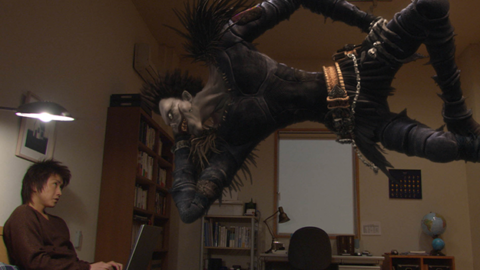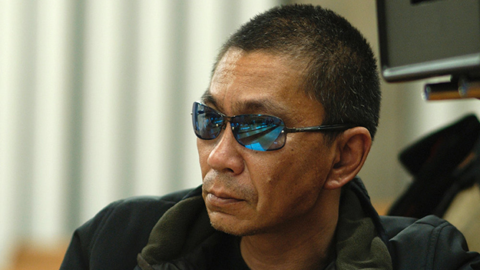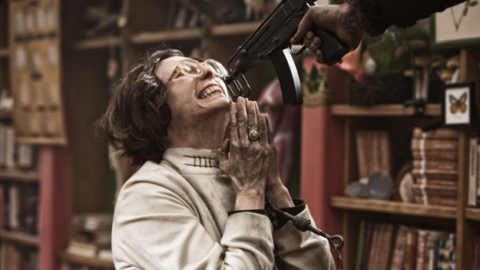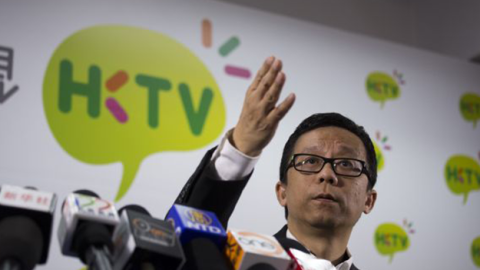Kaiju Shakedown: The Industry Roundup
The current flap over the TPP (Trans-Pacific Partnership) perfectly parallels what’s going on in the Asian film industries right now. While most American news about the TPP consists of terrified warnings of lost jobs, collapsing borders, and the fact that Bernie Sanders hates it, across Asia it’s viewed as a golden opportunity. Korea, Japan, Malaysia, and Singapore see it as a pathway to weaker tariffs and stronger environmental, copyright, and labor laws, and an end to government meddling in the free market. What scares America looks like the future to Asia.

Lost in Hong Kong
It’s the same with most of the major Asian film industries. Korea is currently at the top of the heap in terms of talent, and China, with its huge and hungry audience, is the economic engine driving everyone forward. Hollywood is no longer a major force to be reckoned with, and the U.S. is regarded more and more as just another overseas market, rather than the prime mover.
Despite the current economic crisis in China, the country’s growth isn’t slowing down anytime soon. By September 5 of this year, the Mainland box office had already out-grossed the 2014 box office, raking in $4.8 billion, on track for a $6 billion total for the year. (Compare that to 2012, when the total Mainland box office was $2.6 billion.) Equally amazing is that $1.3 billion of this year’s box office comes from local movies, in particular Raman Hui’s mega-hit Monster Hunt, at $382 million and counting. Hot on its heels is this month’s Lost in Hong Kong, the third of the Lost In comedy franchise, which has grossed $208 million in 10 days.
China’s commercial market is getting better regulated, meaning it’s no longer the snake pit it was even a few years ago when most foreign investors could kiss their cash goodbye. President Xi Jinping’s anti-corruption campaign has Chinese producers and government officials scared straight, and bribery is on the wane. China Film Group recently signed a sealed agreement with the MPAA that allows foreign firms to audit Chinese box office figures, and suddenly there’s a state-sponsored website reporting accurate numbers. This all took place in the wake of the Hundred Regiments Offensive scandal earlier this year when that patriotic film’s victory over Terminator Genisys in earnings collapsed in a cloud of cooked books and fabricated box office figures.

Go Away, Mr. Tumor
But even as commercial films emerge into daylight, independent filmmaking is dying in the shadows. President Xi is a hard-left socialist and, since his inauguration, independent expression is in the crosshairs. Two of the biggest indie film festivals, the Yunnan Multicultural Visual Festival and the Nanjing Independent Film Festival, have both been shut down since 2013, and last year, the police broke up the long-running Beijing Independent Film Festival, detained its founders, and confiscated its archives.
The film industry’s reaction has largely been to shrug because there’s so much lovely money to be made. Young people rule the box office, with historical productions bombing one after the other, from Mabel Cheung’s Three Cities to John Woo’s The Crossing. Contemporary films like the cancer comedy Go Away, Mr. Tumor and the romantic Tiny Times franchise have brought in the big bucks, encouraging even art-house directors like Li Yu to try her hand at romantic comedy. But the future of the Chinese box office belongs to Korea.
Chinese producers have run through all the contemporary intellectual property in China. All their YA novels have been licensed, followed by all the pop songs: My Old Classmate was based on a Gao Xiaosong tune and took in $73 million at the box office. Now they’ve turned to Korea. Miss Granny, the Korean romantic comedy about a sharp-tongued 70-year-old shrew who magically transforms into a 20-year-old hottie, was a huge hit in China when it was remade the following year as 20 Once Again. Korea has suddenly emerged as Asia’s intellectual property bargain warehouse, with Miss Granny remake rights sold to Japan, Thailand, Indonesia, India, Vietnam, and Germany.

20 Once Again
Korean stars like Lee Jeong-Jae (Assassination) are appearing in Chinese films, like Tik Tok, a Chinese production shot in Korea in which Lee plays a Korean cop chasing a Chinese criminal. Chinese singers like Lu Han and Kris Wu have become huge celebrities after joining Korean boy bands (both were in EXO). Kwak Jae-Yong, director of the game-changing Korean romantic comedy My Sassy Girl, is currently shooting Crying Out Love in the Center of the World, based on a Japanese novel, in China. The Korean thriller Blind (11) is being remade in China as The Witness, and the South Korean drama The Attorney (13) is also rumored to be getting remade, with Andy Lau set to star.
Even more surprising, Korea has successfully exported horror movies to China. Korean director Ahn Byung-Ki (Phone) directed a Chinese-language remake of his horror flick Bunshinsaba back in 2012, which grossed $9.6 million, a Chinese record for a horror film at the time. He went on to make Chinese-language sequels, Bunshinsaba 2 (which scored $13 million at the box office) and Bunshinsaba 3. Even more surprising, the four-part Korean horror franchise Whispering Corridors, about hauntings in an all-girls high school, has sold its remake rights to China. That’ll be a real challenge because China not only doesn’t have any all-girls high schools, but it also doesn’t allow the supernatural to appear on film. (SARFT regulations prohibit, “Showing contents of murder, violence, terror, ghosts and the supernatural; distorting value judgment between truth and lies, good and evil, beauty and ugliness, righteous and unrighteous.”)
It’s a good thing that Korea is exporting its horror movies, because the genre is dead both creatively and economically in Korea and most of the rest of Asia. Taka Ichise, the J-Horror genius behind Ju-On (02), The Ring (98), and Dark Water (02), has declared bankruptcy for his Japanese production company because no one wants J-horror anymore. Blumhouse, America’s low-budget, high-profit horror shingle (Paranormal Activity, The Purge), seems predictably behind the times as it signed a six-film deal with Korea’s Showbox to develop a slate of Korean horror movies. In the press release announcing the deal, even the CEO of Showbox sounded unusually modest for a press release: “I hope this will become an opportunity to revive the Korean thriller/horror film market.”
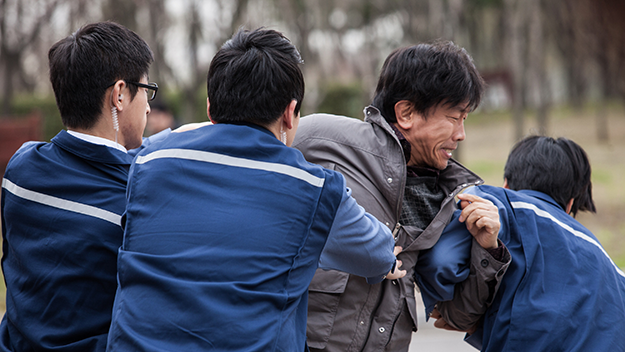
Another Promise
In Korea, the same split between booming commercial films and an imploding independent scene is taking place. The mainstream box office is doing great with movies like Assassination and Veteran earning $12.6 million admissions each this year, although Veteran, with a $4 million budget compared to $16 million for Assassination, is a better bargain. But with so much money at stake, big, vertically integrated studios are playing hardball with their smaller competitors. Last year, exhibitors were fined for favoring films handled by their own production companies and pushing smaller movies into late-night or early-morning slots. Movies with anti-corporate content like Another Promise, which dramatized crimes committed by Samsung, can’t find production funds and have to rely on crowdfunding instead.
On the one hand, as the independent scene dries up in favor of commercial cinema, fewer major international film festivals are featuring Korean films in their line-ups. On the other hand, the booming regional market has given Korea’s brand-name directors unprecedented clout, and many of them, after experimenting with Hollywood, have chosen to return to Korea. Bong Joon-Ho’s new monster movie, Okja, is set to start shooting in April with Jake Gyllenhaal, Paul Dano, Bill Nighy, and Tilda Swinton in the cast. Park Chan-Wook is already shooting his massively budgeted adaptation of Sarah Waters’s Fingersmith in Korea and Japan, even though the book is set in Victorian England. Kim Jee-Woon (The Last Stand) is also tackling a colonial-era movie starring Song Kang-Ho, set entirely in Korea despite being backed by Warner Brothers.
Compared to Korea and China, every other country in Asia is treading water. Hong Kong and Japan in particular show little change from one year to the next, and for Hong Kong that’s a risky proposition. Directors willing to work with a small budget can still make movies there, but the chances for international export are slim. If they want a bigger budget, they have to embrace the Mainland market along with all the content restrictions that brings. Things are somewhat stable at the moment, but all it would take is one financial crisis to put the local film industry in a tailspin again. On a more ominous note, tensions between Hong Kong and China have fostered an anti-Mainland attitude in the city, which does not bode well for the future. The longer Hong Kong fears and loathes Mainlanders with all their money and access to booming markets, the more likely it is that Hong Kong will consign itself to becoming an industry backwater.

Attack on Titan
Japan is in a similar situation with a largely stagnant box office. It has had recent hits like the Attack on Titan movies, and local films continue to hold the majority of the box office over foreign imports, but there’s a massive amount of over-production in Japan, with 651 local releases in 2014 alone, which means that more and more movies are fighting over the same box-office pie. What gives Japan a stability Hong Kong lacks is that it’s home to legions of evergreen intellectual properties like Naruto, Pokemon, Doraemon, and Godzilla.
The commercial/independent split is downright apocalyptic in Thailand, which has seen its industry break neatly into high-end and low-end segments with nothing in the middle. Art-house directors like Apichatpong Weerasethakul and Pen-ek Ratanaruang continue to frequent the international film festival circuit, but they rarely make bank back home. The country’s biggest film producer, Sahamongkol, is rumored to be contemplating getting out of the local movie game, which would be a huge vote of no confidence in the domestic market. Right now, the only Thai distributor who enjoys consistent box office success is GTH, whose relentlessly local productions consist of formulaic romantic comedies starring freshly scrubbed young actors and television adaptations.
Globalization has come for the Asian film industries, and while some still need protection through tariffs and quotas (like Vietnam), others like Korea, Hong Kong, and especially China are not only big enough to stand up to Hollywood, they may be poised to eclipse it entirely.
LINKS! LINKS! LINKS!
…Thanks to religious groups that protested the trailer for the upcoming Thai horror movie Arbat, the Thai government has banned the film the week of its release, citing concerns over its portrayal of monks. Kanittha Kwunyoo’s debut feature is about a young Buddhist monk who starts a relationship with a local girl and, somehow, a Phee Phed (a ghost that’s so tall it can’t reach food) is involved. Sahamongkol, the film’s producer and distributor, is allowed to appeal the ban. The ban comes as a bit of a shock since what’s depicted in the movie is far tamer than In the Shadow of the Naga (10), a Thai film about bank robbers hiding out in a Buddhist monastery, which seemed to establish the boundaries for what was allowable when depicting Thai monks.
…Takashi Miike’s next big project is an adaptation of the popular, 30-volume manga Blade of the Immortal, about a cursed samurai who must kill 1000 men to regain his mortality. Wildly popular and notoriously picky boy band star/actor Takuya Kimura is set to play the lead role.
…Do you miss the old-school, gonzo, over-the-top Takashi Miike? Don’t panic, Hideo Sakaki’s got you covered. His new movie, Kiyamachi Daruma, is about a quadruple amputee yakuza boss who’s on the trail of the underling who betrayed him and got all four of his limbs hacked off. Described as “violent and hard to watch” you can check out a review (and trailer) that’ll make the extremophiles out there want to see more.
…Korea’s got a version of The Exorcist coming up called The Priests that stars Gang Dong-Won and Kim Yun-Seok, and it’s finally got a teaser trailer. It’s set for release this year, but beyond that vague date, there are no further details.
…Speaking of vague release dates, Korean Lee Kyoung-Mi turned out the sharp, spiky anti-romance Crush & Blush back in 2008, and hasn’t directed another film since, despite appearing in movies like The Unjust (10) and The Berlin File (13) for Ryoo Seung-Wan. At long last she’s finished a new film, Home Sweet Home, starring popular actors Kim Ju-Hyeok and Son Ye-Jin as a married couple devoted to the husband’s political career, who have to hush up news of their daughter’s kidnapping on the eve of a closely fought national election. In fact, it has been completed since January of this year, and while a release is slated for sometime in 2015, there’s still no announced date. That’s not a good sign.
…Ryoo Seung-Wan, hot off the success of Veteran, has announced his next movies. First up, he’s shooting the prison-break movie Gun-ham-Do, set on the island of Hashima where Koreans were sent to do forced labor for the Japanese during World War II. Then he’s shooting a sequel to Berlin Files, which he says will be simpler than the original and have more action set in Korea in order to do better at the box office. That’s set for a 2017 release, followed by, of course, a sequel to his big hit, Veteran 2.

Baahubali: The Beginning
…The Indian mega-hit Baahubali: The Beginning was supposed to have its sequel released in September of this year, since both parts were shot back-to-back. However, with 40 percent of Baahubali: The Conclusion in the can, the cast and crew have taken some time off to promote the first movie, which has made $92 million. The Conclusion has had its budget increased by about $10 million (originally both movies were going to come in at $40 million, but now they’re looking at $50 million), and its release date has been pushed back to the end of the year.
…Koreans just can’t stop making movies about the Japanese occupation, and actor Choi Min-Sik (Oldboy) has announced his first project since the massive success of his war movie Roaring Currents. Called The Great Tiger, it’s directed by Park Hoon-Jung (New World) and centers on a hunter recruited to bag the last tiger on the Korean peninsula during the Japanese occupation. Production is slated to last for six months.



